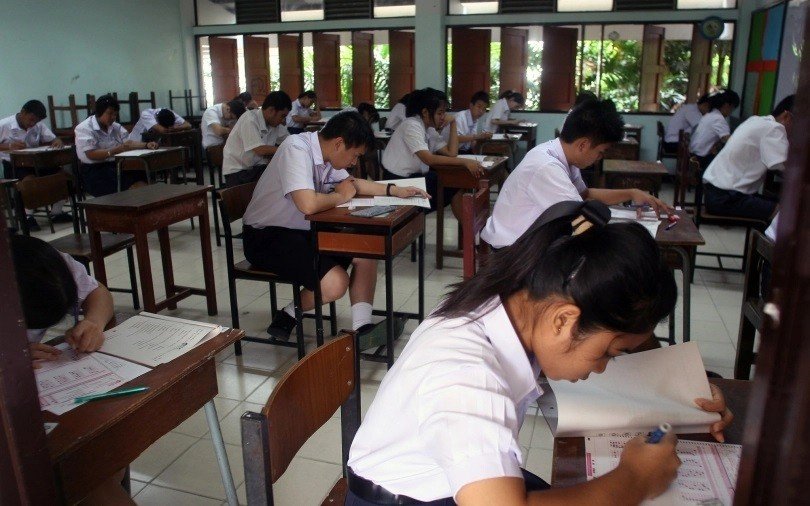Schools in Thailand will open their doors for the first time in more than two years on May 17, as the pandemic recedes.
The Education Ministry made the decision to send kids back to school in line with the government’s transition to living with COVID as an endemic disease.
But while many children will be keen to get back to class, experts say their emotional and other needs must be addressed as they make the big switch from two years of home learning.
Heal children’s souls
Sompong Jitradup, an education expert at the Equitable Education Fund (EEF) and a former lecturer at Chulalongkorn University, suggested that schools devote the first month of the upcoming semester to healing children emotionally.
“The past couple of years were tough. Children now are generally unhappy. So, let them blow away their pain,” he said.
He believes the first month of school should be full of games, talks, home visits, and field trips to help restore children’s spirits and create a happy atmosphere.
“Academic stuff can start later,” the educationalist commented.
Amporn Benjaponpithak, director-general of the Mental Health Department, said some children may have developed emotional or mental issues from not having been able to attend classes and interact with others normally. Such issues could lead to problems like addiction to gaming or mobile phones.
Sompong said that away from school, many children not only suffered lower quality of education but also poorer play quality.
“Over time, they lost confidence and their emotional health suffered. They were not able to keep up with the syllabus through online lessons and they didn’t get to play and interact with friends. This lack of interaction has left them feeling unfulfilled and depressed.”
Assoc Prof Dr. Suriyadeo Tripathi, an expert in children and family development, pointed out that prolonged stress is harmful for children. Schools could help ease their current stress by steering away from rote learning, competitive grading, and overwhelming them with homework.
Among older children, stress is often cited as a reason for suicidal feelings.
Education Ministry’s plan
Education Minister Trinuch Thienthong said her ministry is working with the Public Health Ministry to prepare schools for on-site learning. Schools will hold onsite classes under the “Reduce Risks, Boost Immunity” COVID-19 safety protocol, whereby students and teachers must assess themselves regularly to prevent the virus from spreading.
Active learning would be promoted to boost students’ knowledge and skills, making up for classroom time lost over the past couple of years, Trinuch said.
“We will also promote life and social skills.”
Where priorities lie
EEF expert Sompong urged education authorities to focus on healing and helping children for the next few years, warning that the nation’s future was at stake.
“This generation of children will eventually grow up and join the workforce,” he said. “So, the focus should be not just on onsite learning but also on other aspects of their lives.”
He says the government should take a holistic approach to education so as to deliver comprehensive solutions. As well as understanding children’s need for academic knowledge and well-rounded development, authorities should understand that COVID-19 is both a health and an economic issue. Hence, children may be feeling stressed as their families struggle with the burdens of daily life. Many children have even had to drop out to earn money for their family’s survival.
Reversing dropout trend
As of 2021, Thailand had 7.2 million children of school age. Of these, 1.9 million were at risk of drifting away from school. Many of these dropouts will end up as unskilled workers, trapped by poverty throughout their lives in a cycle that will be repeated by their children.
“To reduce this risk, we need to provide scholarships, food, advice, and cash,” Sompong said, adding that the Student Loan Fund could be used to offer interest-free loans so children can continue their studies and make progress.
Last year, 238,707 students dropped out of school. However, nearly 200,000 were brought back to class through efforts by various parties including the Education Ministry.
“The risk of dropping out is especially high once students have completed Mathayom 3 or junior secondary education,” Sompong said.
He added that though most dropouts are eventually persuaded back to school, half of them may still drift away if they don’t get further support.
Visiting dropouts in the border province of Ratchaburi, Sompong said he could see the pain in the eyes of children who had to leave school.
“While they are glad to be returning to class, they are also worried about what will happen next because they know their family’s financial situation,” he said.
Sompong believes that May will be a crucial juncture in the lives of many children, as they will find out if their parents can afford to send them back to school after two years of COVID-19.
“What the government does this month will also shape children’s educational futures,” he said.
Suriyadeo, who is also director of Moral Center (Public Organization) Thailand, said categorizing students will make it easier to target the groups that need help.
How much does education cost?
Even though the state offers 12 years of free education, parents still have to pay substantial money to have their children properly schooled.
A National Statistical Office survey showed that it costs an average of 17,832 baht per year to educate children up to the age of 15. In Bangkok, it costs an even higher sum of 37,257 baht. School uniforms for a Bangkok-based student cost an average of 2,057 baht per year alone.
Suriyadeo said the mandatory uniforms rule should be scrapped so that poor parents don’t have to borrow money to clothe their children for school.
“I also think schools should relax rules about hairstyles and more,” he added.
What’s happening at universities?
Sompong said universities have been slow in returning to normal, despite knowing that online learning lowers academic quality by a third.
Wilaiwan Jongwilaikasaem, who teaches at Thammasat University’s Faculty of Journalism and Mass Communication, said online learning deprives students of interaction with others and opportunities to familiarize themselves with tools.
“Students end up lacking confidence, especially fresh graduates,” she said.
However, the COVID-19 crisis has had some positive impact, she added. For instance, some film directors have started offering online classes and forums – making their knowledge more accessible than ever before.
“Young people have also become more active about protecting their rights and developing better survival skills,” she said.
By Thai PBS World’s General Desk




